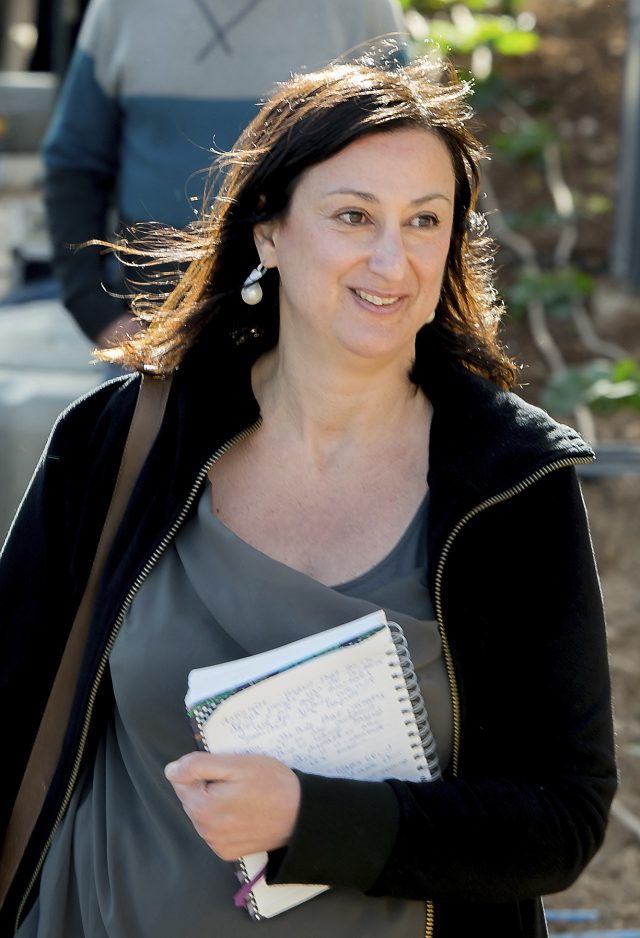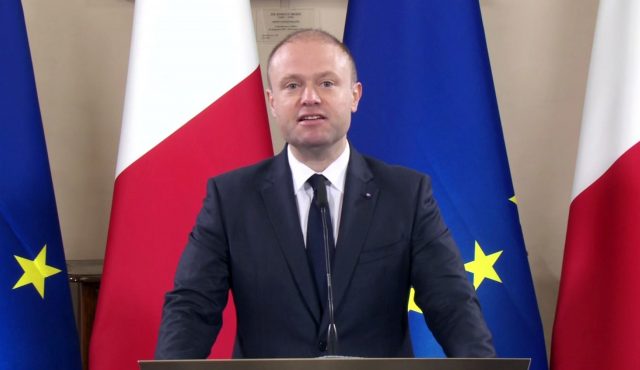
Ten suspects have been arrested over the October 16 car bomb murder of investigative journalist Daphne Caruana Galizia, Malta’s prime minister has announced.
Joseph Muscat said eight Maltese citizens were arrested on Monday morning, given a “reasonable suspicion” of their involvement in Ms Caruana Galizia’s death.
He later tweeted that two others had been arrested with police sources saying they were also Maltese.
 Investigative journalist Daphne Caruana Galizia who was killed by a car bomb in Malta on October 16. (AP Photo/Jon Borg)
Investigative journalist Daphne Caruana Galizia who was killed by a car bomb in Malta on October 16. (AP Photo/Jon Borg)
Overall, Mr Muscat gave almost no details, citing concerns any information could compromise prospects to prosecute the case.
The investigation appeared to be continuing, as police and armed forces had cordoned off an area in Marsa, a small town close to Valletta, the capital.
The arrests, made in an operation coordinated among the Police Corps, the Armed Forces of Malta and the Security Services, were the first known breakthrough in the murder that has drawn widespread outrage and condemnation.
Investigators have 48 hours to question the suspects to decide whether to seek charges, in accordance with Maltese law.
 Malta’s Prime Minister Joseph Muscat announces arrest of the suspects (AP Photo)
Malta’s Prime Minister Joseph Muscat announces arrest of the suspects (AP Photo)
Ms Caruana Galizia, whose reporting focused heavily on corruption on the EU island nation, was killed when a bomb destroyed her car as she was driving near her home.
Europol, the European Union’s police agency, sent a team of organised crime experts to help Maltese police investigate the assassination, joining the FBI and Dutch forensic experts.
Just before her death, Ms Caruana Galizia, 53, had posted on her closely followed blog, Running Commentary, that there were “crooks everywhere” in Malta.
The island nation has a reputation as a tax haven in the European Union and has attracted companies and money from outside Europe as well.
Just last week, a visiting delegation of European Parliament politicians left the island expressing concerns over the rule of law in the tiny EU member country and issued a warning that the “perception of impunity in Malta cannot continue”.
The journalist focused her reporting for years on investigating political corruption and scandals, and reported on Maltese gangsters and drug trafficking.


Why are you making commenting on The Herald only available to subscribers?
It should have been a safe space for informed debate, somewhere for readers to discuss issues around the biggest stories of the day, but all too often the below the line comments on most websites have become bogged down by off-topic discussions and abuse.
heraldscotland.com is tackling this problem by allowing only subscribers to comment.
We are doing this to improve the experience for our loyal readers and we believe it will reduce the ability of trolls and troublemakers, who occasionally find their way onto our site, to abuse our journalists and readers. We also hope it will help the comments section fulfil its promise as a part of Scotland's conversation with itself.
We are lucky at The Herald. We are read by an informed, educated readership who can add their knowledge and insights to our stories.
That is invaluable.
We are making the subscriber-only change to support our valued readers, who tell us they don't want the site cluttered up with irrelevant comments, untruths and abuse.
In the past, the journalist’s job was to collect and distribute information to the audience. Technology means that readers can shape a discussion. We look forward to hearing from you on heraldscotland.com
Comments & Moderation
Readers’ comments: You are personally liable for the content of any comments you upload to this website, so please act responsibly. We do not pre-moderate or monitor readers’ comments appearing on our websites, but we do post-moderate in response to complaints we receive or otherwise when a potential problem comes to our attention. You can make a complaint by using the ‘report this post’ link . We may then apply our discretion under the user terms to amend or delete comments.
Post moderation is undertaken full-time 9am-6pm on weekdays, and on a part-time basis outwith those hours.
Read the rules hereComments are closed on this article